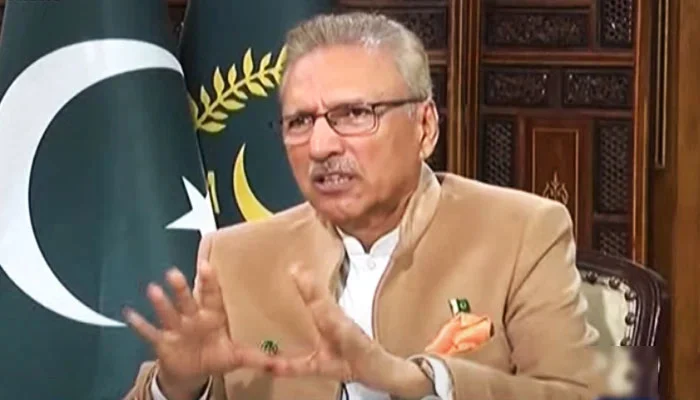By Staff Reporter
ISLAMABAD: President Arif Alvi on Saturday returned a bill to the Parliament, which seeks to diminish the authority of the chief justice, arguing that the proposed legislation exceeds the legislative body’s jurisdiction and may be contested as ‘colorable legislation’.
The parliament last month approved the new legislation, the Supreme Court (Practice and Procedure) Act, 2023, that came after the top judge took a suo motu notice of the Election Commission of Pakistan (ECP) delaying polls in Punjab and Khyber Pakhtunkhwa provinces.
The bill was forwarded to the president to be signed into a law, but President Alvi returned it to parliament for “reconsideration,” according to a tweet on his official account.
“The Bill prima-facie travels beyond the competence of the parliament and can be assailed as a colorable legislation,” it read.
In his detailed reply, which he also posted on Twitter, President Alvi said that he thought it fit and proper to return the bill under the Constitution, with “the request for reconsideration in order to meet the scrutiny about its validity (if assailed in the court of law)”.
He said that “these time-tested rules have been followed ever since the year 1980 — any tinkering with the same may tantamount to interference with the internal working of the Court, its autonomy and independence.”
President Alvi cautioned that any attempt to modify or tamper with these rules could be viewed as interference with the internal workings of the Court, which could compromise its autonomy and independence.
The head of the state further said the top court is an independent institution as “visualised by the founding fathers that in the state of Pakistan independence of the judiciary shall be fully secured”.
“With such an objective in view, Article 191 was incorporated and the Supreme Court was kept out of the law-making authority of the parliament.@
President Alvi said the competence of the Parliament to make laws stemmed from the Constitution itself.
After the President’s refusal to assent to the legislation, the government is likely to get through this bill from a joint session of parliament.
The current crisis, widely seen as a tussle between the top court and the government of Prime Minister Shehbaz Sharif, stems from Chief Justice Umar Ata Bandial on February 23 taking suo motu notice of a delay in elections in Punjab and Khyber Pakhtunkhwa provinces, where legislative assemblies were dissolved in January by ex-PM Imran Khan and his allies.
The move was part of Khan’s bid to force early general elections, since Pakistan historically holds the provincial and national elections together.
According to Pakistan’s constitution, elections must be held within 90 days of the dissolution of a legislative assembly.
The top court this week ordered polls in Punjab on May 14, with the government refusing to accept the verdict. The ruling party maintains the three judges who announced the decision have been “biased” against it, leading to a constitutional crisis in the South Asian country already suffering from economic woes.
The government says it is economically not viable to hold the snap elections in Punjab and Khyber Pakhtunkhwa first and then have another general election this year in October.
On Friday, Sharif’s party also demanded Chief Justice Bandial step down from his post over what it said were “flagrant violations of the law and the constitution.”
The development came after Supreme Court Justice Athar Minallah called on the judiciary to exercise “extreme restraint” in entertaining political questions, since a perception of bias on the part of the top court eroded public confidence.
Justice Minallah was among the four judges who had earlier rejected the suo motu case on elections in Punjab and Khyber Pakhtunkhwa provinces, but a three-member bench, led by Chief Justice Bandial, later ordered polls in Punjab.
Copyright © 2021 Independent Pakistan | All rights reserved




